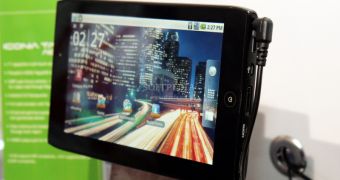As it always happens with new market segments, analysts are looking at tablets and wondering about what will make them true best-sellers, and it seems prices really will be the defining factor.
As end-users well know by now, the Mobile World Congress 2011 expo in Barcelona, Spain, was filled with quite a few new tablet announcements.
Many of them were powered by the NVIDIA Tegra 2 ARM platform and ran the Android 3.0 (Honeycomb) mobile operating system (OS).
Some will start selling sooner than others, but the fact is that the slate market will rise massively during 2011.
Still, there are a few things that may or may not encourage sales, and the prices are, apparently, the most important of them.
As reported by Barrons, the so-called shipment goal of 50 to 60 million tablet sales for this year might not be reached if prices don't fall.
Many models have, certainly, debuted, but they sell for as high as $700 and $800 in the US, or even more in Europe.
This is because some tablets are overpriced, as early adopters are expected to be willing to pay more if it means being among the first to acquire something of the sort.
However, analysts form Citigroup don't think this new segment will prove all that successful unless the average price drops to the $200-$250 range.
"We are not as optimistic about tablet growth as are our peers. Based on the price elasticity for other consumer devices, tablet devices would need to decline to approximately $200 - $250 to expand the market above 50 million units annually," said Glen Yeung, an analyst with Citigroup.
"With the constraints of current technology, [selling tablets at $200 - $250] is not possible. With this is mind, we suspect that the 50 million to 60 million tablet build forecasts for 2011 could result in excess inventories, likely evident by 2H 2011. The counter-argument is simple: tablets will sell well. And while we cannot definitively say they will not, we believe the risk of excess inventory will keep Nvidia Tegra-related multiples range-bound," added Mr. Yeung.

 14 DAY TRIAL //
14 DAY TRIAL //